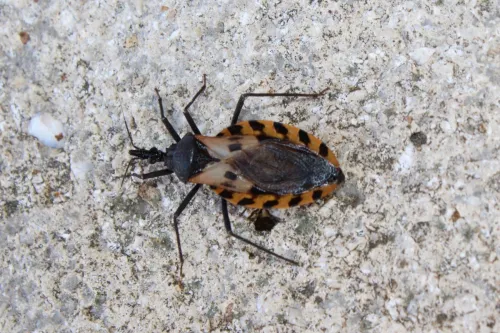New Alert Issued for “Kissing Bug” Insects That Can Cause Heart Problems From Bite

Don’t let their endearing nickname fool you; kissing bugs aren’t to be messed with. In 2021, the species was considered a rarity in Delaware, but fast-forward three years, the deadly disease-carrying insect is now causing concern in the diamond state. Medical entomologist Jennifer K. Peterson called the alarming discovery a “wake-up call” in a press release about her recent research with the University of Delaware. “The bugs are here. They’re making contact with people,” she confirmed. Scientists are now issuing a stark reminder that one bite from this dangerous insect could send you straight to the hospital.
RELATED: Invasive Ant “Super Colonies” Are Taking Over Homes—Here’s How to Protect Yours.
There have been 11 types of kissing bugs detected in 26 U.S. states, according to researchers at Texas A&M University. Reports of kissing bug sightings and bites are most common in Arizona, New Mexico, and Texas. They’ve historically avoided New Jersey, Pennsylvania, and other neighboring mid-Atlantic states…until recently.
A resident in New Castle County, Delaware, found two kissing bugs inside their home within a six-month span in 2023. The first insect was located on their bed pillow, and the second bug was hiding on a baking sheet in the kitchen. Both bugs were the size of a penny and had black, flattened bodies and orange-hued stripes along either side of their stomachs—all the true markings of kissing bugs.

This prompted University of Delaware entomologists to study these two insects—and in a recently released paper published in The American Journal of Tropical Medicine and Hygiene, they confirmed they were, in fact, the kissing bug species Triatoma sanguisuga.
Finding an unrecognizable creepy crawler in bed would give anyone the heebie-jeebies, but researchers confirmed that these specific kissing bugs were carrying a parasite called Trypanosoma cruzi (T. cruzi), which is responsible for Chagas disease.
The World Health Organization (WHO) estimates that Chagas disease affects six to seven million people worldwide. And Texas A&M researchers have found that about 55 percent of kissing bugs are infected with the parasite that causes it.
Kissing bugs have a blood-sucking bite and transmit Chagas disease through their excrement, so they’d have to bite someone and then defecate on the open wound. This is very rare, but according to Peterson, “like any sort of thing, the more times you roll the dice, the more likely you are to get the most unlikely combination.”
“Some kinds of kissing bugs poop while they are feeding; if a person scratches the kissing bug feces into the bite then the person can get sick. The parasite can also enter the body through the mouth or eye if someone touches their mouth or eye with a dirty hand,” Texas A&M researchers further explained. “Dogs can become infected by eating kissing bugs.”
Those who are infected with Chagas disease may experience a skin lesion or purplish swelling, as well as flu-like symptoms such as fever, headache, muscle pain, swollen lymph glands, and difficulty breathing.
However, more significantly, Chagas disease can lead to chronic chest pain. According to WHO, 30 percent of victims suffer from subsequent cardiac disorders, and heart-related symptoms can present themselves years after the initial bite.
“In later years, the infection can lead to sudden death principally due to heart arrhythmia or heart failure caused by the destruction of the heart muscle and its nervous system,” explains the agency.
RELATED: Giant “Parachuting” Spiders Are Spreading Fast and Can’t Be Stopped.
“It’s not surprising that [the bug] was infected,” Peterson said. “It’s more of a wake-up call that this bug needs to be studied,” she said in reference to the species’ evolution.
Peterson theorized that the kissing bugs were likely in search of food when they inhabited the Delaware home. “If there is not enough food in the forest and a kissing bug sees some twinkling lights coming from someone’s house, it’s going to fly in and see if there is a meal,” she noted.
That said, Peterson doesn’t think people should be worried about a kissing bug outbreak.
“I hesitate to say that people need to be concerned or worried,” Peterson said. “Rather, I am a proponent of arming oneself with knowledge.”
Those who may have been bitten by a kissing bug should seek medical attention immediately to rule out Chagas disease.
- Source: Texas A&M University: KISSING BUGS & CHAGAS DISEASE IN THE UNITED STATES
- Source: The American Journal of Tropical Medicine and Hygiene: First Report of Chagas Disease Vector Species Triatoma sanguisuga (Hemiptera: Reduviidae) Infected with Trypanosoma cruzi in Delaware
- Source: WHO: Chagas disease (American trypanosomiasis)